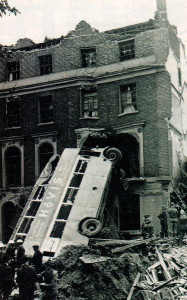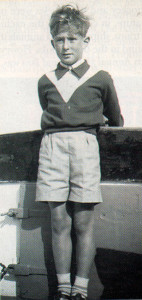
It was during the 1940s that my family moved to Blackpool. Dad had been the victim of bombing during active duty in the Blitz, and although he escaped major wounds, his nerves were shattered and he was discharged honourably from further duties. When the VI flying bombs were being fired at the capital, Dad decided it was time to move to safer climes, and Blackpool seemed to be a haven of peace and tranquility compared with the dangers and deprivation suffered by the population of London.
I was born in Blackpool in 1946. At that time the town was in its heyday, the mecca of the working man whose once-a-year holiday away from the mill or the pit was a welcome relief. It was a world of innocent fun and the Bamforth postcard, and for a boy growing up there it was all very exciting – but it was ‘that year’ of 1953 which I remember so vividly.
My town was the football capital of the country, and I recall being hoisted on to my father’s shoulders in Talbot Square to watch our heroes come back to the town with the FA Cup. Hilary and Tensing conquered the awesome Mount Everest, and Neville Duke took the world air speed record flying at a phenomenal 727.48 mph in the magnificent Hawker Hunter fighter plane which was soon to enter service with the RAF.
What a great country we belonged to, and even to my seven-year-old mind I felt a surge of pride at our achievements – but nothing surpassed that June day when pride in my country saw its fruition in the Coronation of our Queen.
I attended Waterloo Road Junior School in the days when schools had flagpoles and patriotism was second nature when we still had some of our Empire left. All the school assembled in the playground and the flag was run up, then we all sang a song composed by the music teacher. I still remember the verse and tune today:
Someflags are red and blue and green And some are yellow too,
But the dear old flag we love the best Is red and white and blue.
So hail the flag The jolly flag Of red and white and blue.
It was stirring stuff – and why not?
After a prayer we all trooped back to our classrooms for the party. Each child was given a Coronation mug filled with sweets, and we all dived into

the potted meat sandwiches, jelly and orange juice, after which we were dismissed.
The next day was a national holiday, and I remember sitting on the floor of the dining room watching the actual proceedings in glorious black and white on our new Bush television. Later that day my elder sister took me along the road to where the street party was to take place. We sat at the trestle table where ham sandwiches, crisps, the usual potted meat sandwiches and fruit salad with jelly disappeared down so many young mouths faster than Stirling Moss at full speed! Funny hats, crackers, Union flags and Coronation bunting added to the sense of occasion.
We had a very beautiful young Queen and her handsome consort, whose popularity was paramount beyond the shores of our little country.
1953 was a year to remember, and with it came the blossoming of a new Elizabethan era. Even today I look back with pride to that time, and with all the problems we have today I am unashamedly proud of our country as we move into an exciting new century.
Colin M. Foe








